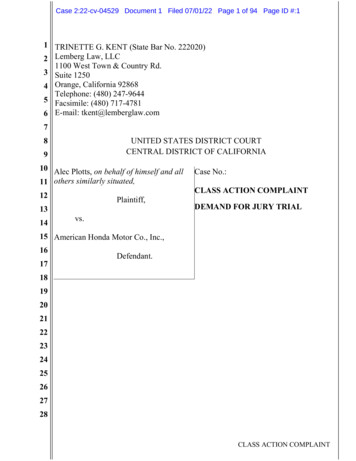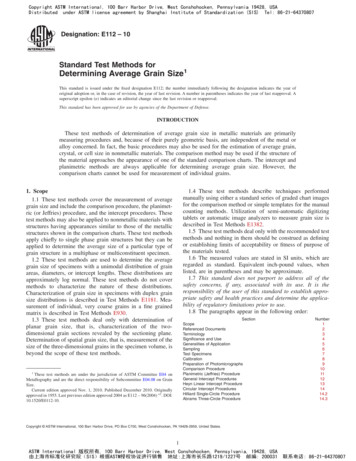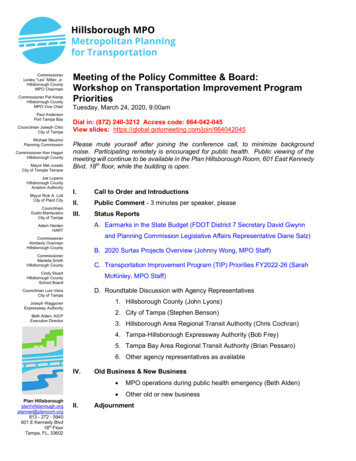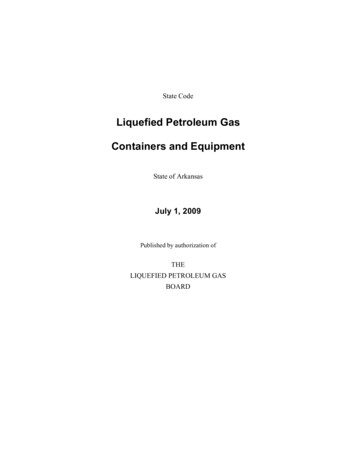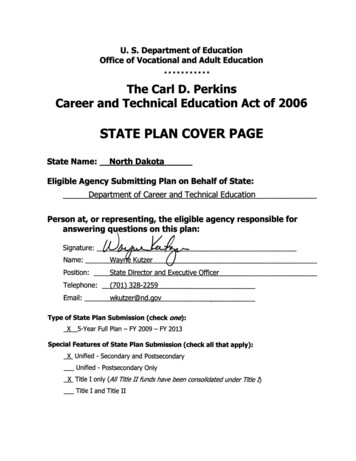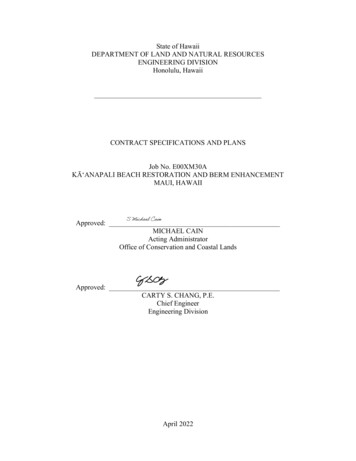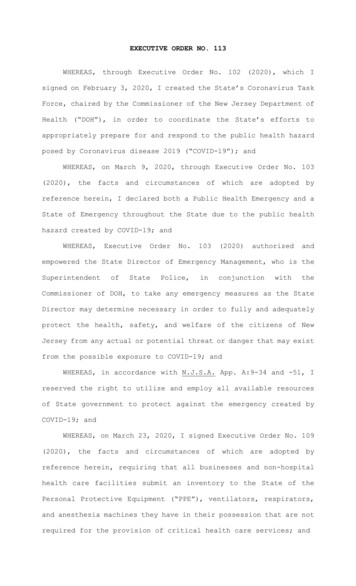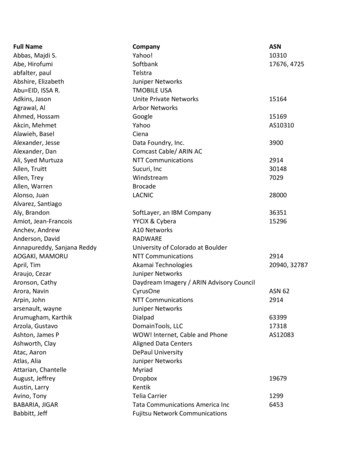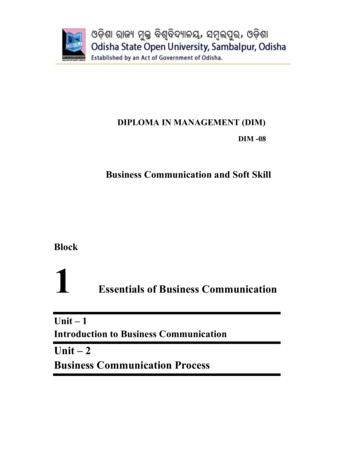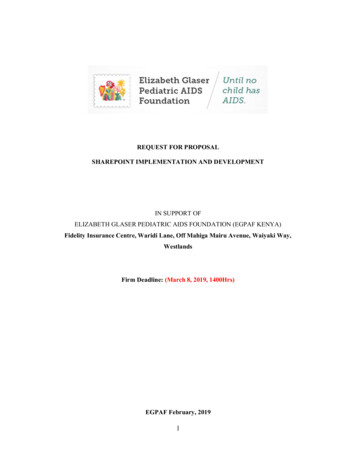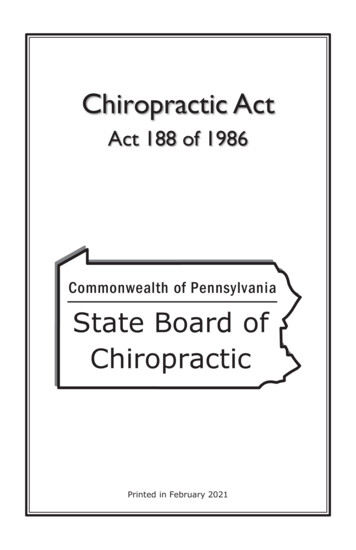
Transcription
Chiropractic ActAct 188 of 1986Commonwealth of PennsylvaniaState Board ofChiropracticPrinted in February 2021
CHIROPRACTIC PRACTICE ACTAct of Dec. 16, 1986, P.L. 1646, No. 188AN ACTCl. 63Providing for the licensing of chiropractors and the regulation of the practiceof chiropractic; establishing the State Board of Chiropractic in theDepartment of State and providing for its powers and duties; providing forthe supervision of colleges of chiropractic, for the examination ofapplicants, for enforcement and for disciplinary actions; providingpenalties; and making repeals.TABLE OF CONTENTSChapter 1. Preliminary ProvisionsSection 101. Short title.Section 102. Definitions.Chapter 3. State Board of ChiropracticSection 301.Section 302.Section 303.Section 304.State Board of Chiropractic.Powers and duties.Approval of chiropractic colleges.Certification to use adjunctive procedures.Chapter 5. Licensure and RegulationSubchapter A. LicensureSection 501.Section 502.Section 503.Section 504.Section 505.Section 506.Section 507.Section 508.Section 509.Applications for license.Examination.Failure of examination.Reciprocity.Limited license.Refusal, suspension or revocation of license.Continuing chiropractic education.Professional liability insurance.Impaired professionals.Subchapter B. General RegulationSection 521. License required.Section 522. Radiologic procedures; education and training required.
Section 523.Section 524.Section 525.Section 526.Section 527.Reporting of multiple licensure.Display of certificate.Doctor of Chiropractic and abbreviation.Relationship with other branches of the healing arts.Revoked licenses; reinstatement; reports to the board.Chapter 6. Supportive PersonnelSection 601. Supportive Personnel.Chapter 7. Penalty ProvisionsSection 701.Section 702.Section 703.Section 704.Practice of chiropractic without license prohibited.Violation of other provisions.Civil penalty.Fines and penalties.Chapter 11. Miscellaneous ProvisionsSection 1101.Section 1102.Section 1103.Section 1104.Section 1105.Section 1106.Section 1107.Fees.Current members of board.Current licensees.Existing regulations.Reestablishment of agency.Repeals.Effective date.The General Assembly of the Commonwealth of Pennsylvania herebyenacts as follows:CHAPTER 1PRELIMINARY PROVISIONSSection 101. Short title.This act shall be known and may be cited as the Chiropractic Practice Act.Section 102. Definitions.The following words and phrases when used in this act shall have themeanings given to them in this section unless the context clearly indicatesotherwise:"Adjunctive procedures." Physical measures such as mechanicalstimulation, heat, cold, light, air, water, electricity, sound, massage andmobilization."Board." The State Board of Chiropractic.
"Bureau." The Bureau of Professional and Occupational Affairs."Chiropractic." A branch of the healing arts dealing with the relationshipbetween the articulations of the vertebral column, as well as otherarticulations, and the neuro-musculo-skeletal system and the role of theserelationships in the restoration and maintenance of health. The term shallinclude systems of locating misaligned or displaced vertebrae of the humanspine and other articulations; the examination preparatory to the adjustmentor manipulation of such misaligned or displaced vertebrae and otherarticulations; the adjustment or manipulation of such misaligned or displacedvertebrae and other articulations; the furnishing of necessary patient care forthe restoration and maintenance of health; and the use of board-approvedscientific instruments of analysis, including X-ray. The term shall also includediagnosis, provided that such diagnosis is necessary to determine the natureand appropriateness of chiropractic treatment; the use of adjunctiveprocedures in treating misaligned or dislocated vertebrae or articulations andrelated conditions of the nervous system, provided that, after January 1, 1988,the licensee must be certified in accordance with this act to use adjunctiveprocedures; and nutritional counseling, provided that nothing herein shall beconstrued to require licensure as a chiropractor in order to engage innutritional counseling. The term shall not include the practice of obstetrics orgynecology, the reduction of fractures or major dislocations, or the use ofdrugs or surgery."Chiropractor." A practitioner of chiropractic."Commissioner." The Commissioner of Professional and OccupationalAffairs."Department." The Department of State of the Commonwealth."Manipulation/adjustment." A passive manual maneuver during which ajoint complex is carried beyond the normal physiological range of motion thatare applied without exceeding the boundaries of anatomical integrity of thejoint complex or other articulations and that are intended to result incavitation of the joint or reduce subluxation.(102 amended Apr. 2, 2002, P.L.232, No.26)CHAPTER 3STATE BOARD OF CHIROPRACTICSection 301. State Board of Chiropractic.(a) Establishment and composition.--There is hereby established withinthe Department of State the State Board of Chiropractic. The board shallconsist of nine members as follows:(1) The commissioner.(2) The Director of the Bureau of Consumer Protection in the Officeof Attorney General, or his designee.
(3) Two members representing the general public who shall beappointed by the Governor with the advice and consent of a majority ofthe members elected to the Senate.(4) Five members, appointed by the Governor with the advice andconsent of a majority of the members elected to the Senate, who arelicensed to practice chiropractic under the laws of this Commonwealthand who have been engaged in the full-time practice of chiropractic in thisCommonwealth for at least five years immediately preceding theirappointment. No member shall be in any manner financially interested inor connected with the faculty or management of any school or college ofchiropractic. No member shall be an officer, representative, agent orconsultant to a local, state or national professional society or privateentity which establishes standards adjudging the practice and fees oflicensed members of the chiropractic profession or shall receive anyremuneration in any form in an amount greater than 5,000 from suchsociety or entity, directly or indirectly, or shall engage in any activityrelated to the chiropractic profession for which he receives remunerationin any form in an amount greater than 5,000, other than in the ordinarycourse of the practice of chiropractic.(b) Term and vacancies.--The term of office of each professional andpublic member shall be four years from his appointment or until his successorhas been duly appointed and qualified according to law but no longer than sixmonths beyond the four-year period. In the event that any member should dieor resign or otherwise become disqualified during his term of office, hissuccessor shall be appointed in the same way and with the same qualificationsas set forth in subsection (a) and shall hold office for the unexpired term. Nomember shall be eligible for appointment to serve more than two consecutiveterms.(c) Quorum and officers.--A majority of the members of the board servingin accordance with law shall constitute a quorum for purposes of conductingthe business of the board. Except for temporary and automatic suspensionsunder section 506, a member may not be counted as part of a quorum or voteon any issue unless he is physically in attendance at the meeting. The boardshall annually select, from among its members, a chairman and a secretary.(d) Compensation.--Each member of the board other than thecommissioner and the Director of the Bureau of Consumer Protection shallreceive 60 per diem when actually attending to the work of the board.Members shall also receive the amount of reasonable traveling, hotel andother expenses incurred in the performance of their duties in accordance withCommonwealth regulations.(e) Attendance at meetings.--A member who fails to attend threeconsecutive meetings shall forfeit his seat unless the commissioner, uponwritten request from the member, finds that the member should be excused
from a meeting because of illness or the death of an immediate familymember.(f) Attendance at training seminars.--A public member who fails to attendtwo consecutive statutorily mandated training seminars in accordance withsection 813(e) of the act of April 9, 1929 (P.L.177, No.175), known as TheAdministrative Code of 1929, shall forfeit his seat unless the commissioner,upon written request from the public member, finds that the public membershould be excused from a meeting because of illness or the death of a familymember.Section 302. Powers and duties.The board shall have powers and duties as follows:(1) To provide for and regulate the issuance of a license to anyperson:(i) who meets the general and educational qualifications ofthis act and who passes the examination specified by the board; or(ii) who meets the requirements for the issuance of a licenseby reciprocity or of a limited license, as provided for in this act.(2) To decide matters relating to the issuance, renewal, suspensionor revocation of licenses.(3) To promulgate, adopt, and enforce in the manner provided bylaw, the rules and regulations necessary to carry out this act.(4) To approve or disapprove chiropractic colleges in accordancewith section 303.(5) To take appropriate actions to initiate injunctive and criminalprosecution proceedings in connection with the unlawful or unauthorizedpractice of chiropractic or other violations of this act. Injunctive andcriminal proceedings shall be instituted in accordance with the act ofOctober 15, 1980 (P.L.950, No.164), known as the CommonwealthAttorneys Act.(6) To provide for and schedule examinations in accordance withthis act and to contract with a professional testing organization for thepreparation and administration of those examinations in accordance withsection 812.1 of the act of April 9, 1929 (P.L.177, No.175), known as TheAdministrative Code of 1929.(7) To conduct hearings and make adjudications, includingadjudications involving disciplinary actions. The board may conduct suchhearings or may designate a member of the board or utilize a qualifiedhearing examiner to conduct such hearings and to prepare adjudications,including adjudications involving disciplinary actions, for final revision andapproval by the board.(8) To keep a record showing the names and addresses of alllicensees under this act.(9) To keep minutes and records of all its transactions and
proceedings, especially with relation to the issuance, denial, registration,formal reprimand, suspension and revocation of licenses. In all actions orproceedings in any court, a transcript of any board record or any partthereof, which is certified to be a true copy by the board, shall be entitledto admission in evidence.(10) To submit annually to the House and Senate AppropriationsCommittees, 15 days after the Governor has submitted his budget to theGeneral Assembly, a copy of the budget request for the upcoming fiscalyear which the board previously submitted to the department.(11) To submit annually a report to the Professional LicensureCommittee of the House of Representatives and to the ConsumerProtection and Professional Licensure Committee of the Senate containinga description of the types of complaints received, status of cases, boardaction which has been taken and the length of time from the initialcomplaint to final board resolution.(12) To hold at least four meetings a year for the conduct of itsbusiness upon giving public notice of such meetings in the mannerprovided by law.(13) To issue subpoenas, upon application of an attorneyresponsible for representing the Commonwealth in disciplinary mattersbefore the board, for the purpose of investigating alleged violations of thedisciplinary provisions administered by the board. The board shall havethe power to subpoena witnesses, to administer oaths, to examinewitnesses and to take testimony or compel the production of books,records, papers and documents as it may deem necessary or proper in andpertinent to any proceeding, investigation or hearing held by it.Chiropractic records may not be subpoenaed without consent of thepatient or without order of a court of competent jurisdiction on a showingthat the records are reasonably necessary for the conduct of theinvestigation. The court may impose such limitations on the scope of thesubpoena as are necessary to prevent unnecessary intrusion into patientconfidential information. The board is authorized to apply toCommonwealth Court to enforce its subpoenas.Section 303. Approval of chiropractic colleges.(a) Approval of colleges.--The board shall approve any chiropractic collegewhich is accredited by a chiropractic accrediting agency recognized by theUnited States Department of Education or the Council on Post-SecondaryAccreditation, but the board shall not approve any chiropractic college whichis not so accredited.(b) Continuation of colleges pending accreditation.--Any college which, onthe effective date of this act, is not accredited as provided in subsection (a)but which has been approved by the board on the basis of a self-study andinspection or has current status as a recognized candidate for accreditation as
provided in subsection (a) or whose graduates were admitted to the mostrecent examination for licensure under the act of August 10, 1951 (P.L.1182,No.264), known as the Chiropractic Registration Act of 1951, shall have fiveyears from the effective date of this act in which to obtain accreditation asprovided in subsection (a). Such colleges shall continue to offer chiropractictraining and education in accordance with the requirements of theDepartment of Education of the Commonwealth. The Department ofEducation of the Commonwealth shall periodically ascertain, by inspectionand otherwise, the quality of instruction and facilities possessed by suchcolleges. A person shall be admitted to the licensing examination and shall beeligible for licensure if he otherwise satisfies the requirements of this act andif he graduated from any such college prior to the effective date of this act,graduated within five years from the effective date of this act, or graduatedmore than five years from the effective date of this act but was enrolled atsuch college on the expiration of five years from the effective date of this act.Section 304. Certification to use adjunctive procedures.(a) Qualifications.--In addition to its other powers and duties under thisact, the board shall have the power and duty to certify qualified licensees touse adjunctive procedures. To obtain such certification, a licensee shall submitan application to the board on a form provided by the board showing to thesatisfaction of the board that the licensee:(1) passed an examination for licensure to practice chiropractic,which examination included the use of adjunctive procedures, providedthat no person shall be required to take or pass an examination includingthe use of adjunctive procedures in order to obtain a license under thisact;(2) passed an examination on the use of adjunctive procedures,which examination was prepared and administered by a qualified andapproved professional testing organization in accordance with section812.1 of the act of April 9, 1929 (P.L.177, No.175), known as TheAdministrative Code of 1929;(3) completed a minimum of 100 hours of study in the use ofadjunctive procedures, as approved by the board; or(4) used adjunctive procedures in the licensed practice ofchiropractic for three years immediately preceding the effective date ofthis act, provided that in order to maintain such certification such alicensee shall, as part of the continuing education required for renewal ofa license under this act, complete such additional study in the use ofadjunctive procedures as required by the board.(b) Implementation.--The requirement for certification to use adjunctiveprocedures shall not become effective until January 1, 1988, provided that theboard shall expedite review of applications for certification beginning on theeffective date of this act.
CHAPTER 5LICENSURE AND REGULATIONSUBCHAPTER ALICENSURESection 501. Applications for license.(a) Requirement for licensure.--An applicant for a license under this actshall submit satisfactory proof to the board that the applicant meets all of thefollowing:(1) Is 21 years of age or older.(2) Is of good moral character.(3) Has a high school diploma or its equivalent.(4) Has completed two years of college or 60 credit hours.(5) Has graduated from an approved college of chiropractic, withsuccessful completion of not less than the minimum number of hours ofclassroom and laboratory instruction required by regulation of the board,which minimum shall be at least 4,000 hours.(6) Has passed the examination required under this act.(7) Has not been convicted of a felonious act prohibited by the actof April 14, 1972 (P.L.233, No.64), known as The Controlled Substance,Drug, Device and Cosmetic Act, or of an offense under the laws of anotherjurisdiction which if committed in this Commonwealth would be a felonyunder The Controlled Substance, Drug, Device and Cosmetic Act, unlessthe applicant satisfies all of the following criteria:(i) At least ten years have elapsed from the date of conviction.(ii) Satisfactorily demonstrates to the board that he has madesignificant progress in personal rehabilitation since the convictionsuch that licensure of the applicant should not be expected to createa substantial risk of harm to the health and safety of his patients orthe public or a substantial risk of further criminal violations.(iii) Satisfies the qualifications contained in this act.An applicant's statement on the application declaring the absence of aconviction shall be deemed satisfactory evidence of the absence of aconviction, unless the board has some evidence to the contrary. As usedin this section the term "convicted" shall include a judgment, an admissionof guilt or a plea of nolo contendere.(b) Renewal of licenses.--A license shall be renewed biennially for aperiod of two years upon payment of the biennial fee, provided that thelicensee satisfies the other requirements of this act. Any person who has failedto renew his license for a period of longer than five years shall be required toapply for a license in accordance with subsection (a) if he desires to resume
practicing chiropractic.Section 502. Examination.(a) Admission.--The board shall admit to a standard examination anyapplicant who has satisfied all of the requirements of section 501 except forthe requirement to have passed the examination. The board may, in itsdiscretion, permit a student in good standing in his final semester in anapproved chiropractic college to be admitted to the standard examination,provided he meets all the other requirements of this act, but he must havecertification of graduation from said college before a license may be granted.(b) Nature and content of examination.--The examination shall be oral,practical and written, upon the principles and technique of chiropractic andshall include the following subjects: anatomy, physiology, histology, chemistry,pathology, physics, bacteriology, diagnosis, hygiene and sanitation,symptomatology, chiropractic analysis, X-ray, chiropractic principles and apractical demonstration of chiropractic technique.(c) When conducted.--Examinations shall be conducted at least twiceeach year.(d) Testing organization.--All written, oral and practical examinationsrequired under this section shall be prepared and administered by a qualifiedand approved professional testing organization in accordance with section812.1 of the act of April 9, 1929 (P.L.177, No.175), known as TheAdministrative Code of 1929, except that the oral and practical examinationsshall not be subject to section 812.1 until such examinations are availablefrom a testing organization.(e) Score.--A license shall be granted to an applicant who meets therequirements of this act and who achieves:(1) an overall score of at least 75% on the entire examination; or(2) an average score of at least 75% on the oral and practicalexamination and a passing score on the written examination administeredby the National Board of Chiropractic Examiners as such passing score isdetermined by the national board.Section 503. Failure of examination.(a) Second examination.--Any applicant who shall fail any examinationshall, after the expiration of six months and within two years, have theprivilege of taking a second examination.(b) Subsequent examinations.--The board may adopt regulationsgoverning the eligibility of applicants who have failed to pass twoexaminations to be admitted to subsequent examinations.Section 504. Reciprocity.The board may grant licenses without further examination to individualsfrom other states and provinces of Canada if all of the following conditions aremet:(1) The standards for licensing in such states or provinces are
substantially the same as those provided in this act.(2) Similar privileges are accorded persons licensed in thisCommonwealth.(3) The applicants hold valid licenses.(4) The applicable rules and regulations prescribed by the board arecomplied with.Section 505. Limited license.(a) Requirements.--The following educational and professionalrequirements must be met in order to secure a limited license which may beissued to an out-of-State or foreign chiropractic school or college graduate fora period not to exceed one year for the purpose of teaching in an approvedgraduate chiropractic education program:(1) The applicant must submit a letter of appointment to teach orpractice from a training institution in this Commonwealth.(2) The applicant must submit an application for licensure consistingof evidence that all requirements contained in this act have been met.(3) The applicant must submit evidence that he has had teachingexperience or its equivalent which is acceptable to the board.(4) The applicant must submit to an oral examination in his specialtyconducted by a board member or the board's designated representative.(b) License to practice.--Persons granted limited licenses under thissection shall not be authorized to practice chiropractic in this Commonwealthother than for the purpose of teaching, which shall not include treatment ofpatients, and those persons who subsequently desire to obtain a license forthe practice of chiropractic shall be required to meet the standards for suchlicense as set forth by regulation.(c) Use of titles.--The use of titles such as "fellow," "fellowship,""consultant," "visiting professor" or similar designations of an individual in ahealth care institution does not eliminate the need for proper licensure underthis act for the practice of chiropractic.Section 506. Refusal, suspension or revocation of license.(a) Reasons enumerated.--The board may refuse to issue a license or maysuspend or revoke a license for any of the following reasons:(1) Failing to demonstrate the qualifications or standards for alicense contained in this act or regulations of the board.(2) Making misleading, deceptive, untrue or fraudulentrepresentations in the practice of chiropractic.(3) Practicing fraud or deceit in obtaining a license to practicechiropractic.(4) Displaying gross incompetence, negligence or misconduct incarrying on the practice of chiropractic.(5) Submitting a false or deceptive biennial registration to theboard.
(6) Being convicted of a felony, a misdemeanor in the practice ofchiropractic, or receiving probation without verdict, disposition in lieu oftrial or an Accelerated Rehabilitative Disposition in the disposition offelony charges, in the courts of this Commonwealth, a Federal court, or acourt of any other state, territory, possession or country.(7) Having a license to practice chiropractic suspended, revoked orrefused or receiving other disciplinary action by the proper chiropracticlicensing authority of another state, territory, possession or country.(8) Being unable to practice chiropractic with reasonable skill andsafety to patients by reason of illness, drunkenness, excessive use ofdrugs, narcotics, chemicals or any other type of material, or as a result ofany mental or physical condition. In enforcing this paragraph, the boardshall, upon probable cause, have authority to compel a chiropractor tosubmit to a mental or physical examination by physicians approved by theboard. Failure of a chiropractor to submit to such examination whendirected by the board, unless such failure is due to circumstances beyondhis control, shall constitute an admission of the allegations against him,consequent upon which a default and final order may be entered withoutthe taking of testimony or presentation of evidence. A chiropractoraffected under this paragraph shall at reasonable intervals be afforded anopportunity to demonstrate that he can resume a competent practice ofchiropractic with reasonable skill and safety to patients.(9) Violating a lawful regulation promulgated by the board orviolating a lawful order of the board previously entered in a disciplinaryproceeding.(10) Knowingly aiding, assisting, procuring or advising anyunlicensed person to practice chiropractic contrary to this act orregulations of the board.(11) Committing immoral or unprofessional conduct. Unprofessionalconduct shall include any departure from, or failure to conform to, thestandards of acceptable and prevailing chiropractic practice. Actual injuryto a patient need not be established.(12) Soliciting any engagement to perform professional services byany direct, in-person or uninvited soliciting through the use of coercion,duress, compulsion, intimidation, threats, overreaching or harassingconduct.(13) Failing to perform any statutory obligation placed upon alicensed chiropractor.(14) Intentionally submitting to any third-party payor a claim for aservice or treatment which was not actually provided to a patient.(15) Failing to maintain chronological documentation of patient carein accordance with regulations prescribed by the board.(16) Making representations that chiropractic treatment will cure
cancer or an infectious or communicable disease.(17) Holding himself out as a specialist unless he possesses apostgraduate certification in that specialty.(18) Unconditionally guaranteeing that a cure will result from theperformance of chiropractic treatment.(19) Failing to refer a patient to a licensed practitioner of anotherbranch of the healing arts for consultation or treatment when a diagnosisof such patient indicates that such a referral is appropriate.(b) Discretion of board.--When the board finds that the license of anyperson may be refused, revoked or suspended under the terms of subsection(a), the board may:(1) Deny the application for a license.(2) Administer a public reprimand.(3) Revoke, suspend, limit or otherwise restrict a license asdetermined by the board. Unless ordered to do so by a court, the boardshall not reinstate the license of a person to practice chiropractic whichhas been revoked, and such person shall be required to apply for a licenseafter a five-year period in accordance with section 501 if he desires topractice at any time after such revocation.(4) Require a licensee to submit to the care, counseling or treatmentof a physician or physicians designated by the board.(5) Suspend enforcement of its findings thereof and place a licenseeon probation with the right to vacate the probationary order fornoncompliance.(6) Restore a suspended license to practice chiropractic and imposeany disciplinary or corrective measure which it might originally haveimposed.(c) Procedure.--All actions of the board shall be taken subject to the rightof notice, hearing and adjudication and the right of appeal therefrom inaccordance with Title 2 of the Pennsylvania Consolidated Statutes (relating toadministrative law and procedure).(d) Temporary suspension.--The board shall temporarily suspend a licenseunder circumstances as determined by the board to be an immediate andclear danger to the public health or safety. The board shall issue an order tothat effect without a hearing, but upon due notice to the licensee concernedat his last known address, which shall include a written statement of allallegations against the licensee. The provisions of subsection (c) shall notapply to temporary suspension. The board shall thereupon commence formalaction to suspend, revoke or restrict the license of the person concerned asotherwise provided for in this act. All actions shall be taken promptly andwithout delay. Within 30 days following the issuance of an order temporarilysuspending a license, the board shall conduct, or cause to be conducted, apreliminary hearing to determine that there is a prima facie case supporting
the suspension. The licensee whose license has been temporarily suspendedmay be present at the preliminary hearing and may be represented bycounsel, cross-examine witnesses, inspect physical evidence, call witnesses,offer evidence and testimony and make a record of the proceedings. If it isdetermined that there is not a prima facie case, the suspended license shall beimmediately restored. The temporary suspension shall remain in effect untilvacated by the board, but in no event longer than 180 days.(e) Automatic suspension.--A license issued under this act shallautomatically be suspended upon the legal commitment of a licensee to aninstitution because of mental incompetency from any cause upon filing withthe board a certified copy of such commitment; conviction of a felony underthe act of April 14, 1972 (P.L.233, No.64), known as The Controlled Substance,Drug, Device and Cosmetic Act; or conviction of an offense under the laws ofanother jurisdiction, which, if committed in Pennsylvania, would be a felonyunder The Controlled Substance, Drug, Device and C
OYDQLD 6WDWH %RDUG RI &KLURSUDFWLF - Pennsylvania Department of State . Title
